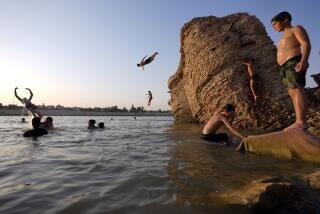Violence Flares in Fuel-Short Basra
- Share via
BASRA, Iraq — Iraq’s second-largest city erupted in riots Sunday when a second day of protests over huge gasoline lines and electricity blackouts turned ugly.
The violence seemed to mark a drastic change in the southern metropolis, which has been relatively tranquil.
Sabotage, smuggling and infrastructure problems have all but cut the electricity in recent days as temperatures soared well into the 100s.
Fuel has also been in short supply. The electricity problems have interrupted refinery operations, and large-scale smuggling of crude oil and diesel has diverted supplies, primarily to neighboring Kuwait.
On Sunday, tankers were delivering fuel to gas stations, heavily guarded by British tanks to ward off hijackers. Still, in some parts of the city, lines stretched for a mile or more, forcing people to wait at least 12 hours. As frustration grew, protests erupted. Rioters targeted British military vehicles and foreigners, pelting their cars with rocks and bricks.
Roads were blocked with rocks, tree trunks and burning tires. One British military jeep was burned.
At least one Iraqi was shot in a confrontation with British forces, although it was unclear whether the person was killed. The British said a Nepalese Gurkha guarding mail being delivered for the United Nations was killed by gunmen, Reuters news agency reported.
The riots, in the city’s north, were smaller than Saturday’s protests but more violent, British soldiers said.
“They’re shooting at us,” said one soldier manning a checkpoint. “It’s the petrol queues. They’ve been without electricity for four days now.”
Many Iraqis are convinced that the U.S.-led occupation forces could provide electricity and gasoline, if only they made it a priority.
“We have no electricity, no gasoline, no water, no butane, no wood,” said Aruba Saad, a housewife. “Why don’t the Americans do something? How do they expect us to live? We’re not animals.”
Near the southern city of Diwaniyah, a U.S. soldier in a convoy died of heat stress Saturday, Central Command said. Another soldier was found dead in his quarters of unknown causes.
Sunday’s unrest came as two Arab television networks broadcast videos of masked fighters calling for armed uprisings against occupation forces.
One of the videos, on the Al Arabiya network, showed five armed fighters who said they were associated with organizations called “White Flags” and “Muslim Youth.”
They promised more attacks on U.S.-led forces but condemned Thursday’s car bombing at the Jordanian Embassy in Baghdad, which killed 17 people.
The other tape, on Al Jazeera, included four fighters who identified themselves as members of the “Iraqi Resistance.” They disassociated themselves from Saddam Hussein’s regime and criticized it for offering too little resistance to the invasion.
If authentic, the Al Jazeera tape would indicate that Iraqis who opposed Hussein’s government, and not just regime loyalists, might be fighting the U.S.-led occupation.
Meanwhile, in Baghdad, a man dropped a grenade on U.S. soldiers delivering mattresses to a Baghdad University dormitory, injuring five people. None of the injuries were serious, but the incident illustrated that even goodwill missions carry danger.
The soldiers were part of an Army 1st Armored Division detachment that was helping restore a looted dorm.
The grenade was dropped from an upper floor as Pvt. Mohammed Aziz was being interviewed by an Al Jazeera television crew near the ground-floor entrance. Two soldiers and three Iraqi workers were hurt.
The same unit was the target of a similar attack that seriously injured two soldiers two weeks ago at the dormitory.
Squad members Sunday fired at a man suspected of dropping the explosive from a third-floor balcony. The soldiers interrogated all male occupants, but no arrests were made.
The dormitory is adjacent to the university’s Faculty of Islamic Studies, where student militants of the strict Wahhabi sect have warned against any cooperation with Americans.
“There is a small percentage of Iraqi people doing their best to stop us from helping the majority,” Lt. Col. John Kem said. “They won’t stop us.”
*
Kraul reported from Baghdad.
More to Read
Sign up for Essential California
The most important California stories and recommendations in your inbox every morning.
You may occasionally receive promotional content from the Los Angeles Times.













